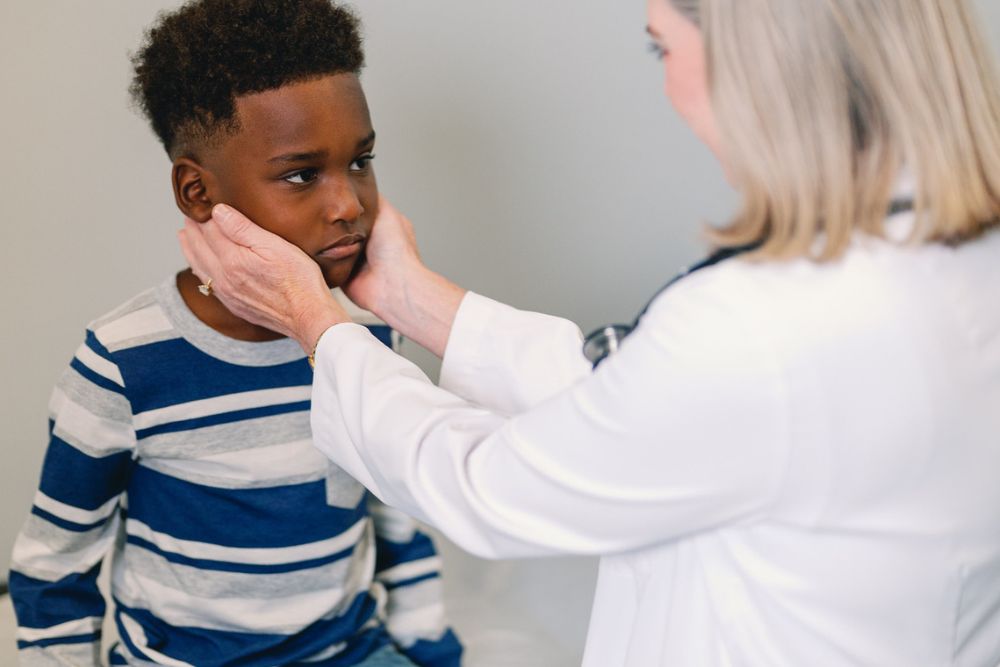The Scoop on Staph Infections for Parents

Your kid can come home with all kinds of things on their skin, and some are more pleasant than others. From bruises and scrapes to rashes, blisters, and the occasional sticker, most aren’t usually a cause for concern. But staph infections, a bacterial skin condition, can take some parents by surprise. Common in schools and extremely contagious, early treatment is key to prevent serious potential problems. As a partner in your family’s health, Urgent Care of Fairhope is here to help you get the knowledge you need to keep your children safe and give you the scoop on staph infections.
What is a Staph Infection?
Staph infections are typically caused by a genus of bacteria called Staphylococcus. There are dozens of types of staph bacteria, but most skin infections are caused by Staphylococcus aureus. These types of bacteria are common and usually harmless; they live on the skin of even healthy individuals, especially around the nose, mouth, and groin areas. They become problematic when they enter the body through a cut, break or scrape in the skin, leading to an infection.
MRSA (Methicillin-resistant Staphylococcus aureus) is a type of staph bacteria resistant to many modern antibiotics, making it a more severe concern. It’s crucial to identify and treat these infections early to prevent complications.
Signs and Symptoms of Staph Infections in Children
Staph skin infections in children can manifest in various ways. Here are some common signs and symptoms to watch out for:
- Wound Infections: If an existing wound is infected with staph, it may appear swollen, red, and warm to the touch. The wound may ooze pus or fluid. Your child may experience pain, fever, or fatigue.
- Boils: These are pus-filled bumps under the skin that may cause swelling, redness and pain. They may need to be drained by a healthcare professional.
- Impetigo: This highly contagious skin infection is common among young children. It appears as red sores or blisters on the face, hands or feet. The sores can rupture, ooze, and form a yellow-brown crust.
- Cellulitis: This deeper layer skin infection presents as a red, swollen, and tender area, often with a fever. It can spread rapidly if not treated, making it especially concerning in children.
- Scalded Skin Syndrome: Caused by toxin-producing strains of staph bacteria, this condition starts with a fever and rash. The skin looks as if it’s been burned by boiling water, leading to peeling and redness. It’s more common in infants and young children under 5.
If left untreated, staph infections can lead to more severe issues like bloodstream infections, pneumonia, or even bone infections. That’s why it’s crucial to catch and treat these infections early.
Staph Infection Treatment in Kids
Antibiotics are the first-line treatment for most staph infections. These may be given by mouth or as a topical ointment applied directly to the skin. It is essential to complete the full prescription of antibiotics, even if symptoms improve. In more serious infections, boils or abscesses may need to be drained and treated by a healthcare professional.
If your doctor suspects a MRSA skin infection, cultures will be taken and tested to determine the most effective antibiotic.
At home, proper hygiene practices can help prevent the spread of staph infections to other areas or other people:
- Don’t directly touch infected skin.
- Keep the area covered with a clean, dry bandage whenever possible.
- Use a new towel each time you clean and dry the area. Wash used towels alone in warm or hot water, using bleach if possible.
- Wash your hands thoroughly with soap and warm water frequently, especially after cleaning or changing bandages.
- Do not share clothing, towels, bed sheets, or linens until the infection is fully healed.
Let Urgent Care of Fairhope Lend a Skilled Hand
If you suspect a staph infection in your child, pay a visit to our Fairhope walk-in clinic. Our staff is trained to diagnose and treat infections with care, compassion and skill. We even have on-site laboratory testing and off-site partnerships to run cultures and provide more advanced treatment options. Check the waitlist online before you arrive to be sure you can get in, get out, and get back to smooth and healthy skin!
Search our Blog
Recent Posts
Low-Carb Snacks for Diabetic Kids: Tasty, Fun, and Blood Sugar-Friendly
Finding the right snacks for kids with Type 1 diabetes can feel like a challenge. You want something delicious, but also something that won’t send their blood sugar on a rollercoaster ride. The key? Low-carb, [...]
Measles Guide for Parents: What You Need to Know
Recent measles outbreaks have many parents on high alert, and with good reason—measles is one of the most contagious viruses in the world. While it was once considered a routine childhood illness, modern medicine has [...]
Everything You Need to Know About the Fairhope Arts & Crafts Festival
In Fairhope, it doesn’t really feel like spring until we’re counting down the days to our favorite annual springtime event: the Fairhope Arts and Crafts Festival. Now in its 73rd year, this downtown celebration is [...]
The Facts on Fifth Disease: What Parents Need to Know
If your child has come home with rosy cheeks that seem more like a rash than a healthy glow, it might not just be the weather. Fifth disease, also known as “slapped cheek syndrome,” is [...]
Flu FAQs for Parents
Flu season is here, and if you’re a parent, you know how quickly it can turn your home into a germ war zone. We’ve seen an uptick in flu cases recently at Urgent Care of [...]
Mardi Gras 2025: Fairhope Festivities And Fun For All
It’s time to let the good times roll! The 2025 Daphne and Fairhope Mardi Gras season starts rolling soon with a full schedule of parades, balls, and festive celebrations along the Eastern Shore. It’s one [...]

